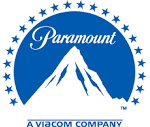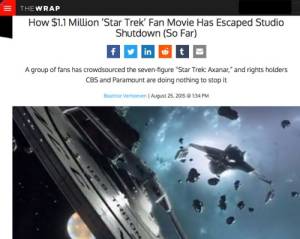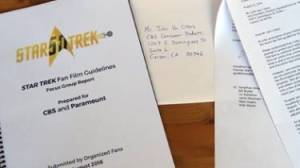Deposition Details Paramount's Minimal Role in Fan Films
Document Reveals Direct Connection Between Axanar Case and Fan Film Guidelines
Table of Contents
Newly released confidential testimony from a Paramount executive on December 13, 2016, demonstrated the studio’s minimal involvement with fan films, both highlighting and belying Axanar’s claim that no guidance existed to aid fan filmmakers in avoiding legal trouble.
Not Confidential
Excerpts from the September 30 deposition of Paramount Pictures’ vice president for rights and research, Daniel O’Rourke, were filed for public view after federal Judge R. Gary Klausner denied a request by Axanar’s pro bono defense attorney, Erin Ranahan of Winston & Strawn, to file the document under seal — away from public scrutiny.
Though the deposition excerpt was part of a defense filing, the material was deemed confidential by Paramount under the terms of a protective order governing the discovery process in the copyright infringement case against defendants Alec Peters and his company, Axanar Productions. CBS, the other owner of Star Trek, is the other plaintiff in the case.
However, Klausner had warned attorneys on both sides that simply referring to the protective order was insufficient justification for keeping documents away from public scrutiny.
The Studios and Fan Films
The document, officially known as Exhibit 2 in a declaration to the court made by Winston attorney Brian Li-A-Ping, was intended to support the defense's rebuttal to objections made by the studios to Axanar’s motion for a summary judgment. Such a decision by the judge in the defendants’ favor would bring the case to a swift conclusion by avoiding the time and expense of a jury trial.
No Clear Guidance
A key point of the defense case was the claim that without clear guidance from Star Trek’s copyright holders, defendant Peters had little to help him navigate the legal waters with regard to his production, the feature film Axanar, for which he had raised $1.4 million.
The defense had argued the studios’ hands-off treatment of fan films created a tradition upon which Peters relied in believing his production fell within CBS and Paramount’s tolerated use of Star Trek by fan productions.
« This case created misconceptions about our feelings about fan films. » — Paramount Executive VP Daniel O’Rourke
New Fan Film Guidelines
In the course of the lawsuit, CBS and Paramount issued a set of newly restrictive guidelines for fan productions that replaced what had been a common understanding between the studios and fan producers allowing fan films to be made so long as the productions didn’t make any money. O’Rourke’s questioning starts off in the excerpt by referring to these guidelines.
'Misconceptions'
For the first time, O’Rourke drew a direct connection between the Axanar case and the new guidelines released in June 2016:
Certain things in this case created misconceptions about our feelings about fan films. So we determined that this was a good time to put these out to clarify the issues.
Other Topics
Oki also inquires about how Paramount communicated concerns to fan producers and how fans have reacted to the guidelines since their release.
Transcript
The excerpt from O’Rourke’s deposition was relatively short, and is reproduced here largely intact, with annotations. The questioner is Winston attorney Kelly Oki. The attorney present for Paramount and CBS was Jonathan Zavin of Loeb & Loeb.
Fan Film Guidelines
Oki: Did Paramount have a role in drafting these [new fan film] guidelines?
O’Rourke: Any role played by Paramount in drafting them was played by in-house counsel.
Oki: Do you know what Paramount’s role was without divulging any communications between counsel?
O’Rourke: I do not.
 Oki: Did CBS consult with Paramount in the drafting of these?
Oki: Did CBS consult with Paramount in the drafting of these?
O’Rourke: I don’t know, personally.
Oki: Has Paramount ever previously had anything like these guidelines?
O’Rourke: No.
Oki: So Paramount had never previously disseminated any sort of guidance to fans on how to go about creating fan films.
O’Rourke: No. And as part of my due diligence, one of my discussions with Scott Martin [Paramount’s executive vice-president of intellectual property] in his non-attorney role was about our historic view. And we have always addressed everything on a case-by-case basis and then the attorney then has made a decision of how we reacted to anything.
Oki: Was there any disagreement between Paramount and CBS over the drafting of the guidelines?
O’Rourke: I don’t know.
Oki: When did the process of drafting the guidelines begin?
O’Rourke: I don’t know.
Oki: Why did Paramount choose to implement guidelines rather than banning fan films all together?
O’Rourke: As I previously mentioned, certain things in this case created misconceptions about our feelings about fan films. So we determined that this was a good time to put these out to clarify the issues, to delineate in this fashion what was acceptable and what was not.
Communicating with Fan Producers
Paramount vs. CBS
 The two studios are separate subsidiaries that share a common parent — Viacom — and each owns specific rights to Star Trek. Axanar has, in the past portrayed Paramount as an active participant in the oversight of fan films. O’Rourke’s testimony makes clear that while no formal guidelines existed before the Axanar case, it was CBS that largely oversaw fan film activities, and that any issues surrounding fan films were dealt with on a case-by-case basis.
The two studios are separate subsidiaries that share a common parent — Viacom — and each owns specific rights to Star Trek. Axanar has, in the past portrayed Paramount as an active participant in the oversight of fan films. O’Rourke’s testimony makes clear that while no formal guidelines existed before the Axanar case, it was CBS that largely oversaw fan film activities, and that any issues surrounding fan films were dealt with on a case-by-case basis.
Oki: So prior to the existence of these guidelines, would a creator of a fan film have any way to know what would be acceptable to Paramount in creating a Star Trek fan film?
O’Rourke: No.
Oki: And so how would that fan film creator learn of, you know, what is acceptable? Would they just have to wait to be contacted or how would that work?
O’Rourke: I’m not sure.
Oki: Has Paramount ever previously contacted the creator of a — as far as fan films about, you know, compliance with any unofficial guidelines?
O’Rourke: I am not sure of any specific instances, but again, for the last ten years, CBS has handled enforcement and would have — CBS is the party that would have interactions with fan films.
Contacting Axanar

Oki: So did Paramount ever reach out to either Axanar or Mr. Peters prior to the filing of this lawsuit about any of the Axanar works?
O’Rourke: I am not sure.
Fans' Reactions
Oki: What have fan reactions been to the guidelines?
[Studio attorney Jonathan] Zavin: Objection; he can’t possibly know how all fans reacted to the guidelines.
Oki: Let me rephrase that question. … Have you received any reaction to the — have you, you know, Paramount, received any reaction to the guidelines?
O’Rourke: Yes, a small group of fans took it upon themselves to I think do a — I don’t know if it was a focus group or a poll about the fan guidelines, and they provided us a detailed packet of those results.
[End of deposition excerpt.]
Keywords




